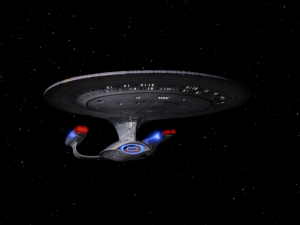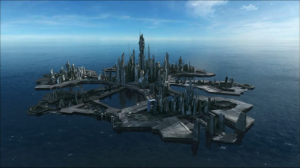Franchise Potential, Part 2
- December 8th, 2014
- Posted in Opinion/Analysis
- Write comment
 So last week I discussed what makes a show capable of producing spinoffs that succeed independently, and a big part of that was the parent show having an open premise. Star Trek was simply about the exploration of space, while Battlestar Galactica was narrowly focused on the story of human survival after the end. The fact that it’s set in space is almost incidental most of the time. But there has to be another aspect to it. After all, Lost in Space and Space 1999 were contemporaries of Star Trek TOS with similarly open premises and yet they’re all but forgotten by comparison. So what else is there?
So last week I discussed what makes a show capable of producing spinoffs that succeed independently, and a big part of that was the parent show having an open premise. Star Trek was simply about the exploration of space, while Battlestar Galactica was narrowly focused on the story of human survival after the end. The fact that it’s set in space is almost incidental most of the time. But there has to be another aspect to it. After all, Lost in Space and Space 1999 were contemporaries of Star Trek TOS with similarly open premises and yet they’re all but forgotten by comparison. So what else is there?
The other big thing that has to be considered is what the focus of the show truly is. Is it on the premise? Or is it on the characters? That’s not to say that a premise driven show must have weak characters; some of TNG’s best episodes are ones like “The Inner Light” which focus primarily on character and leave the sci-fi aspects in the background. But at the core of Star Trek is the idea of a human-based exploration agency exploring the stars. It wasn’t a show about how great Kirk is, in spite of what you may have heard. That translated well to a spinoff: the premise is the same, the basic setting is the same, but this time it’s a different crew, with a slightly different history and different challenges ahead. And again, with Voyager and then Enterprise (we’ll set DS9 aside, as it’s a special case). Embracing those differences while maintaining a strong connection to the core of the franchise’s premise was key to TNG’s success.
Let’s compare this to its fellow long-runner from across the pond, Doctor Who. Doctor Who is about traveling through time and space, but more than that, it’s about the Doctor and his companions. The Doctor’s face may change, his opinions and behaviors may change to some extent, but at heart it’s been about the same character since November 1963. True, the Doctor doesn’t appear in every single episode, but he doesn’t have to. Even when he’s not on screen, the events revolve around him or are related to him in some way (with one or two notable exceptions, like the First Doctor serial “Mission to the Unknown”). His name is in the title, after all. And of the major Doctor Who spinoffs from its long and oddly complex history of them, the three most successful ones (Torchwood, Sarah Jane Adventures, and K-9) each took the same basic format. A popular character (Captain Jack Harkness, Sarah Jane Smith, K-9) serves as the central focus and holds a role very similar to that of the Doctor. Jack has his future knowledge much like the Doctor, and both he and Sarah Jane have advanced tech, even including “sonic lipstick” on her part. They fight off aliens and protect the Earth, just like the Doctor. Heck, both shows even have to deal with the problem of, “well who cares if they fail. Won’t the Doctor just come and save us?”
That pretty much just left one big way for them to distinguish themselves, and that was via their target audience. Torchwood went more adult than Doctor Who, and Sarah Jane Adventures went younger, thus taking advantage of the fact that they were separate shows to do things that Doctor Who couldn’t or shouldn’t. But Doctor Who, once again, has that very open premise. There’s literally no reason that Doctor Who ever has to end; no necessary actors to worry about aging or renegotiating with, as the Doctor can be recast any time. The only central story is of his various adventures. So, in spite of being a very character focused show, it still possesses the ability to create spinoffs and become a franchise.
So take another show that’s heavily focused on the characters, like, say, Firefly this time. As popular as that show has turned out to be, why hasn’t Fox or anyone tried to make a spinoff? Because, quite simply, the thing that made the show special was who it was about, not what it was about. And unlike the Doctor, the characters aboard Serenity aren’t effectively immortal, nor are their actors. If you tried to pull a Star Trek TNG-style spinoff with Firefly, the complaints you’d likely get would be, mostly, “why?”. Firefly has no aliens or cyborgs or robots or anything like that. The most distinctive thing about it, characters aside, is the heavily Western-influenced setting. So trying to set another show in that universe with new characters in the future would mostly leave one wondering why they should care about these new people and what pressing reason this show had for sharing a universe. Heck, it’d probably be more accused of being a knockoff or money grab than anything else. Even trying to pick just one character from the group to focus a spinoff on would likely end badly. None of them really have what it takes to be the sole focus, nor to act as a base to build a new crew on. Everything the new crew did would be clouded in questions of “what happened to Mal and the others?” Which, luckily, was something TNG was able to avoid, thanks to the TOS films.

Being isolated from Earth in this massive unknown city helped SGA establish itself from its predecessor.
Which brings us to the last point: any spinoff or attempt at franchise formation must feel necessary in some way. That’s not to say that the purpose of a spinoff is to fill in the cracks that the parent show left behind, like BSG tried to do. Rather, there has to be room for a spinoff to grow and become something more than a rehashing or shadow of its predecessor, ultimately justifying its presence as a part of that existing universe. TNG stopped trying to copy the Kirk/Spock/McCoy dynamic and worked with the characters it had, and was all the better for it. DS9 went through the same struggle, to stop copying TNG and find its own voice, which turned out to be about war and the in-depth exploration of what (on TNG) would be a planet-of-the-week. Stargate Atlantis took the premise of Stargate off of Earth and used it as a way of exploring some of the world’s background, by focusing on this city of the Ancients and the mess they created over in that galaxy. Part of the reason Universe didn’t last as long was that it shared almost exactly the same basic premise, except instead of a city, it was a starship. Torchwood (as explained above) took the loose premise of Who and put a more adult spin on it. Caprica did none of these things; it could have, it was going to eventually, but in the time that it had, it didn’t bother. Heck, we can even say this about Agents of S.H.I.E.L.D., in that the first half of season 1 added little of value to the MCU and it wasn’t until it was allowed to build up its own plot about the G.H. and start pointing towards the revelations we’ve had in season 2 that it began to earn its right to exist.
Are there more reasons why some shows have franchise potential and some don’t? Anything you think I’ve missed? Leave a message in the comments!





No comments yet.